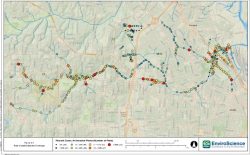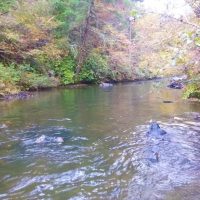 (Mobile, AL) The Mobile Bay National Estuary Program (MBNEP) promotes the wise stewardship of water quality and living resources in the Mobile Bay estuarine system. The Mobile Bay watershed drains two-thirds of Alabama and parts of Mississippi, Georgia, and Tennessee and is the most biodiverse drainage basin in North America. Three Mile Creek (TMC) supports a broad diversity of marine and freshwater species in a highly urbanized area. EnviroScience, Inc. assisted MBNEP in developing a plan to control invasive species in the 30+ square mile TMC watershed by working closely with the client and local and regional subject area experts. Major challenges included abundant invasive species, particularly island apple snail, alligatorweed, Chinese tallow (popcorn tree), cogongrass, and Japanese climbing fern. These invasions often cause a loss of biological diversity within both the plant and animal communities.
(Mobile, AL) The Mobile Bay National Estuary Program (MBNEP) promotes the wise stewardship of water quality and living resources in the Mobile Bay estuarine system. The Mobile Bay watershed drains two-thirds of Alabama and parts of Mississippi, Georgia, and Tennessee and is the most biodiverse drainage basin in North America. Three Mile Creek (TMC) supports a broad diversity of marine and freshwater species in a highly urbanized area. EnviroScience, Inc. assisted MBNEP in developing a plan to control invasive species in the 30+ square mile TMC watershed by working closely with the client and local and regional subject area experts. Major challenges included abundant invasive species, particularly island apple snail, alligatorweed, Chinese tallow (popcorn tree), cogongrass, and Japanese climbing fern. These invasions often cause a loss of biological diversity within both the plant and animal communities.
To provide a qualitative evaluation of invasive species within the TMC watershed, EnviroScience used a plot-based sampling design to document invasive and native species and their locations. A total of 43 invasive plant species and two invasive animal species were quantified during spring and fall sampling events.
From this data, EnviroScience developed a watershed-wide and species-specific plan to control invasive species within the TMC watershed. The invasive species control plan (ISCP) contains prescriptive measures and associated costs and schedules for its implementation. Included in the ISCP is an interactive electronic database that considers multiple factors, including the target species; their location; and labor, supplies, and equipment costs that are scalable and can be used by MBNEP to estimate the effort to control other Mobile Bay watersheds.
Few environmental firms in the country retain EnviroScience’s degree of scientific know-how, talent, and capability under one roof. The diverse background of our biologists, environmental engineers, scientists, and divers enable us to provide comprehensive in-house services and an integrated approach to solving environmental challenges—saving clients time, reducing costs, and ensuring high-quality results. Our expertise includes but is not limited to: aquatic survey (including macroinvertebrate surveys and biological assessments); ecological restoration; ecological services (including impact assessments and water quality monitoring); emergency response; engineering and compliance services; endangered mussel surveys; laboratory and analysis; stormwater management; threatened and endangered species; and wetlands and streams (including delineation and mitigation.) Further, EnviroScience is one of the few biological firms in the country that is a general member of the Association of Diving Contractors International (ADCI) and offers full-service commercial diving services.

